Key takeaways:
- Understanding and effectively handling guest complaints can transform negative experiences into opportunities for building trust and improving services.
- Empathy and active listening are crucial strategies for resolving complaints and enhancing guest satisfaction.
- Personalized follow-ups after resolving complaints can strengthen relationships and create lasting loyalty among guests.
- Regularly analyzing guest feedback leads to meaningful improvements and innovations for future events.
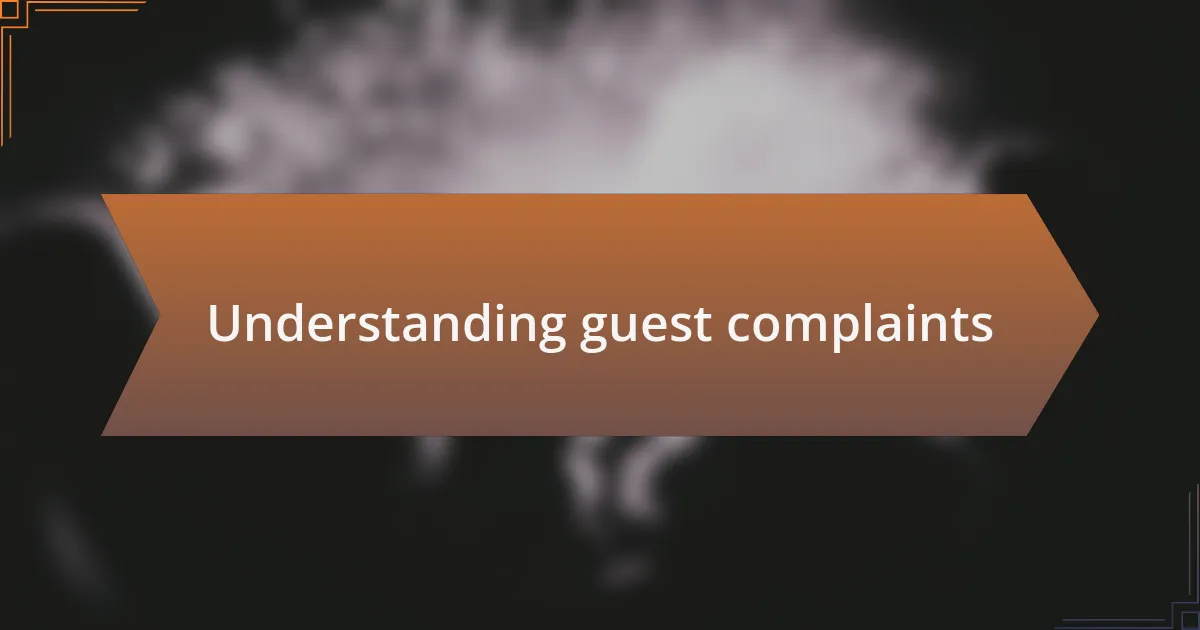
Understanding guest complaints
Understanding guest complaints is essential in event management because they often highlight unmet expectations or shortcomings in service. I recall a time when I received a complaint about a venue’s inadequate seating arrangements during an important event. This made me realize that complaints, while sometimes difficult to hear, serve as crucial feedback that can help improve the overall experience for guests.
Consider this: Have you ever been in a situation where a small oversight turned into a major issue for someone? Developing a keen sense of empathy is vital. When I took the time to genuinely listen to that upset guest, their frustration transformed into relief as I addressed their concern. Such moments remind me that a complaint isn’t just a problem; it’s an opportunity to build trust and enhance guest satisfaction.
Many guests don’t voice their displeasure directly, but their silence can be telling. I remember managing an event where a few attendees expressed dissatisfaction through subtle body language, like crossed arms or distracted gazes. Recognizing these cues is vital; it prompts deeper engagement rather than waiting for an overt complaint. Understanding guest complaints is about decoding emotions and expectations, allowing us to respond proactively rather than reactively.
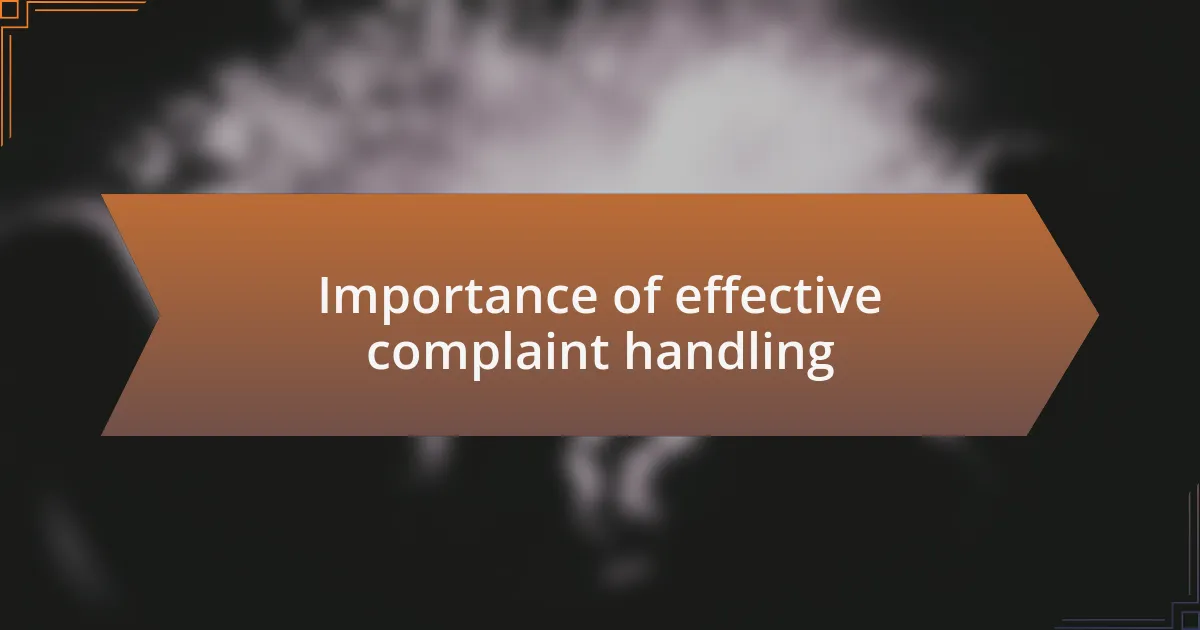
Importance of effective complaint handling
Handling complaints effectively is crucial in event management as it directly influences guest satisfaction and retention. I often think about a particular event where a guest expressed dissatisfaction with the catering. By addressing this promptly, not only did we resolve the issue, but we also demonstrated our commitment to delivering a high-quality experience, reinforcing the guest’s loyalty.
Consider this: what do guests remember most about an event? For many, it’s not just the highlights but how any issues were addressed. During one event, I remember a guest who was visibly upset due to noise disruptions. By taking immediate action and ensuring they felt heard, we turned their negative experience into a memorable moment of care. This proactive approach is not just about problem-solving; it fosters a strong rapport and trust between the event team and attendees.
Moreover, effective complaint handling can uncover insights that lead to operational improvements. Reflecting on my experience, I had a guest once comment on our registration process being a bit confusing. That feedback prompted us to streamline our approach, benefiting future attendees. Ultimately, when we view complaints as valuable insights rather than mere inconveniences, we pave the way for richer, more rewarding experiences for everyone involved.
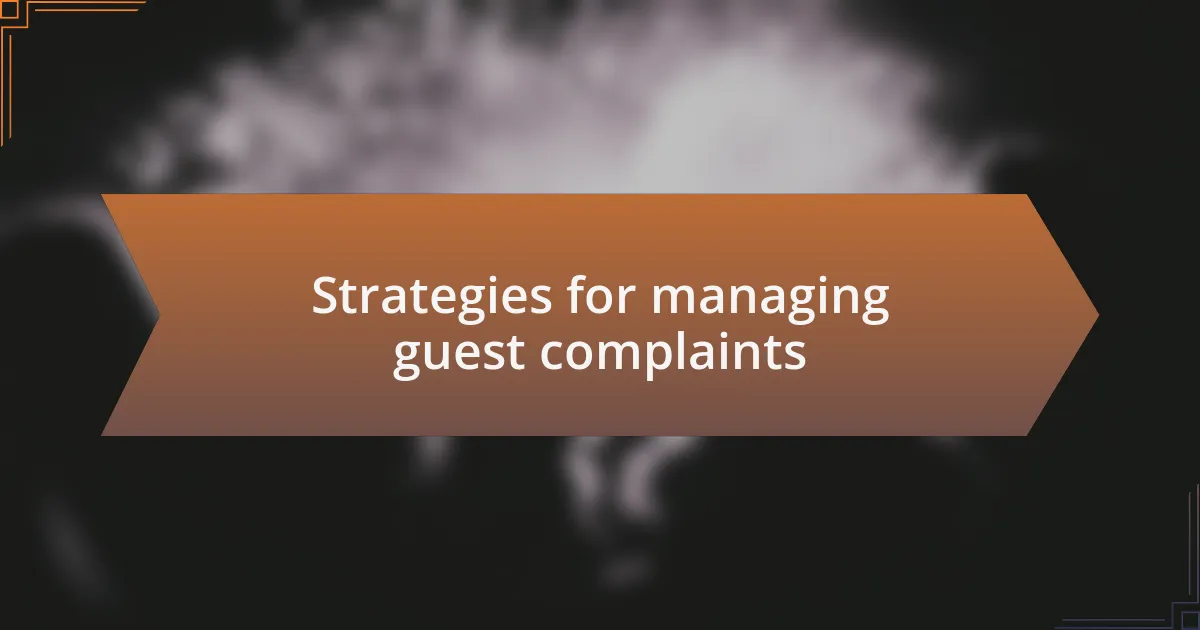
Strategies for managing guest complaints
One effective strategy I’ve found is actively listening to guests when they voice their concerns. I remember a time when a guest was unhappy with the seating arrangement at a wedding I managed. Instead of just apologizing, I engaged them in conversation, asking for their suggestions on how we could make it better. This not only provided immediate relief for the guest but also made them feel valued in the decision-making process.
Another strategy involves training your team to respond with empathy and understanding. I once had a staff member address a complaint about broken AV equipment. They acknowledged the frustration it caused, which immediately diffused the situation. Empathy goes a long way; when guests feel you’re genuinely invested in resolving their issues, they’re more likely to appreciate the effort and remain loyal to your services.
Finally, I’ve learned the importance of following up after resolving a complaint. After addressing an issue with a guest during a corporate event, I made it a point to check in with them days later. This small gesture highlighted our commitment to their satisfaction and cultivated a sense of community. Have you considered how follow-ups might enhance your relationships with guests? They can turn a fleeting complaint into lasting loyalty.
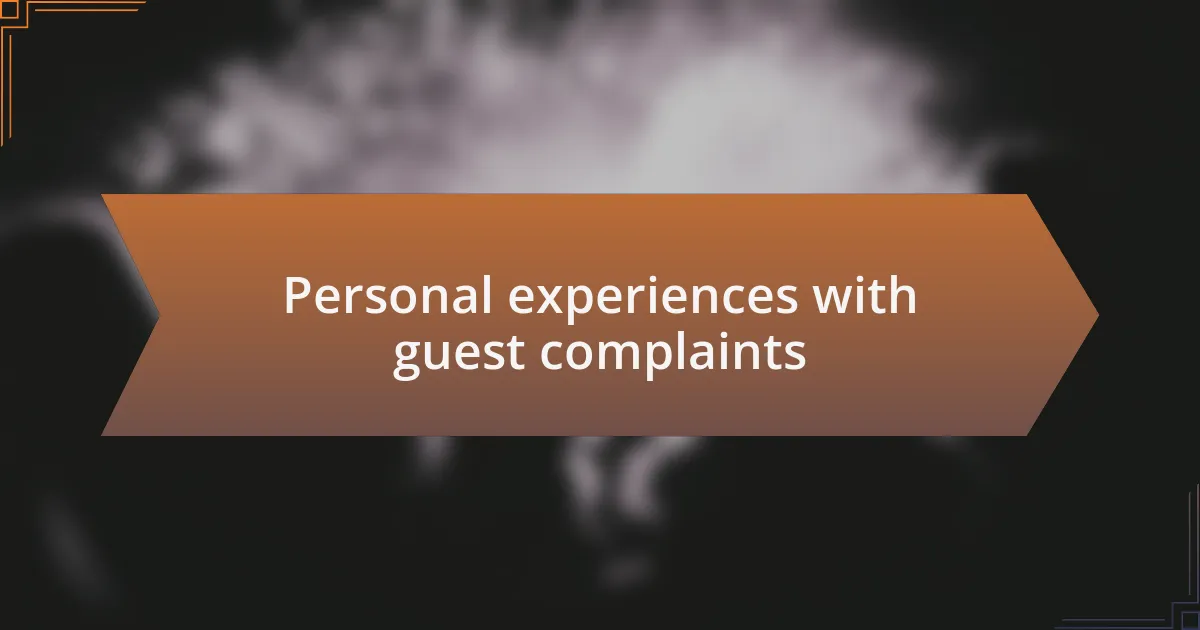
Personal experiences with guest complaints
When I think back on my experiences with guest complaints, one particular incident stands out. I was managing a birthday party where the cake was accidentally delivered late. The guest was understandably upset. Rather than just offering an apology, I took a moment to empathize with their disappointment. I shared a personal story about a cake mishap at my own birthday, which seemed to lighten the mood. This connection shifted the atmosphere, turning the complaint into a more manageable conversation.
Another time, during a gala dinner, a guest expressed frustration over the noise level from a nearby event. I could feel their irritation, and it reminded me of a time when I had been in their shoes. I invited them to my side, where it was quieter, and offered complimentary drinks as a gesture of goodwill. That small action transformed their dissatisfaction into a moment of enjoyment. It made me realize how crucial it is to step into the guest’s shoes and respond accordingly; have you had similar experiences where a personal touch made a difference in resolving complaints?
On a separate occasion, after addressing a complaint about the food quality at a conference I organized, I decided to initiate follow-up calls with attendees. I was a bit nervous, wondering if they would appreciate the gesture or see it as insincere. However, the feedback I received was overwhelmingly positive, with many thanking me for checking in. That experience taught me that genuine follow-ups can create lasting connections, turning previous frustrations into fond memories of how we cared for their experience. What about you? Have you ever found that an unexpected follow-up made a lasting impact on a relationship?
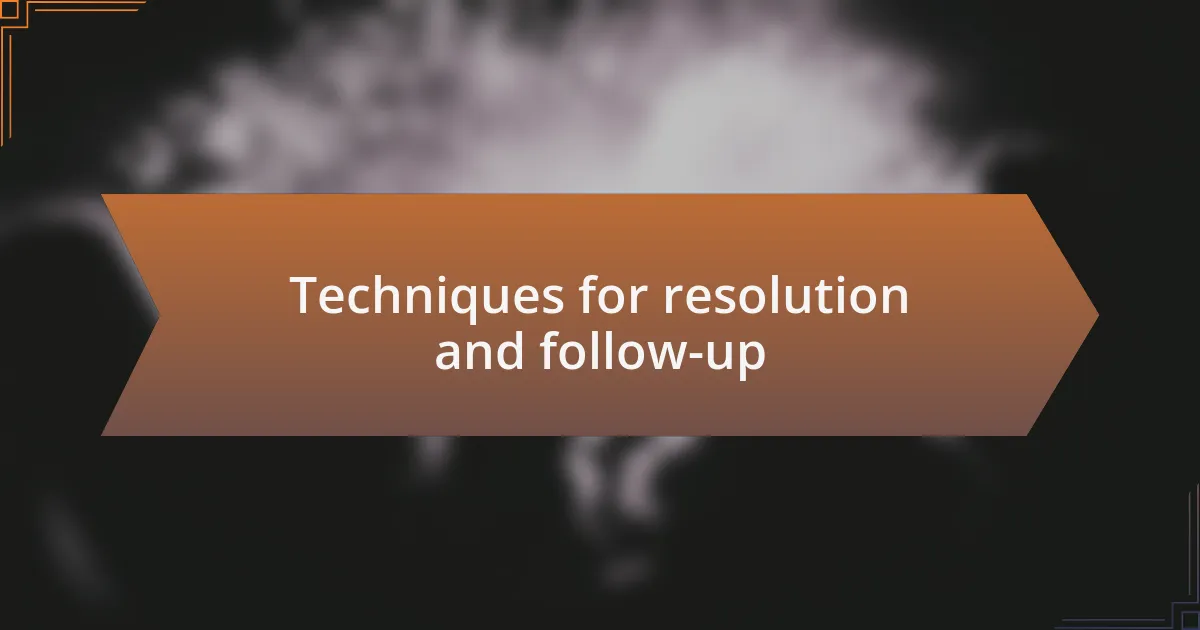
Techniques for resolution and follow-up
One technique that has worked wonders for me is implementing a structured follow-up system after any complaint is resolved. In one case, a guest mentioned the seating arrangement at an outdoor wedding wasn’t ideal. After promptly addressing their concern, I made it a point to check in with them a few days later. Hearing their gratitude for the follow-up reinforced my belief that knowing someone cares can truly transform an experience. Have you ever considered how just a few minutes of your time can leave a lasting impression?
Additionally, I find that personalizing the follow-up makes all the difference. For instance, after addressing a complaint regarding a miscommunication about the event schedule, I sent a handwritten thank-you note to the guest. The heartfelt gesture not only acknowledged their concern but also highlighted our commitment to their satisfaction. It struck me how such a simple act could turn a dissatisfied guest into a loyal advocate. Have you ever thought about the power of a personalized acknowledgment in your own experiences?
Lastly, I’ve learned that resolving complaints promptly and effectively sets the tone for future interactions. When a guest raised an issue about the audio quality during a corporate event, I acted immediately by providing them a solution and offering a discount for their next booking. To my surprise, they not only accepted the resolution but also returned for future events, positively sharing their experience with others. This made me realize that rapid response can lead to renewed trust and even stronger relationships. Have you noticed how swift resolutions can alter perceptions in your own event management journey?
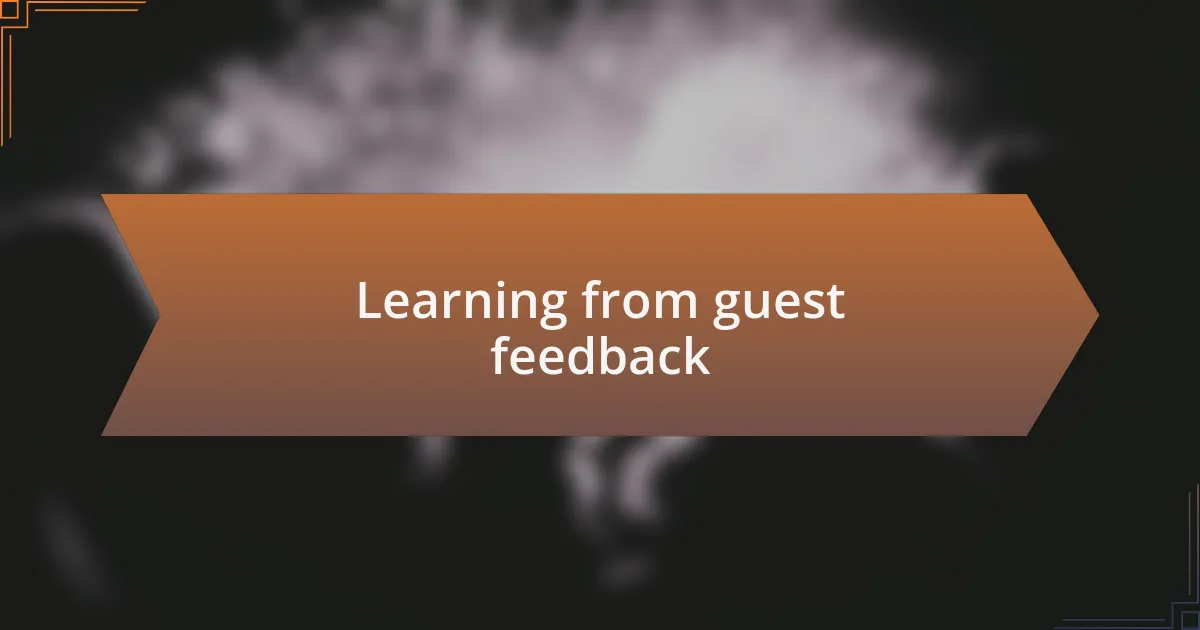
Learning from guest feedback
Hearing feedback from guests has always been a cornerstone of my approach to event management. One memorable instance involved a couple who felt their catering experience fell short during their reception. After addressing their complaint, they opened up about their love for gourmet cuisine. This dialogue not only helped me enhance future menus but also deepened my understanding of what truly matters to clients. Have you ever found that a single piece of feedback can open the door to greater insights?
I’ve realized that analyzing feedback regularly allows me to identify patterns that can guide improvements. For example, over a period of several events, multiple guests mentioned the need for more seating options in common areas. Taking this seriously, I worked with venues to ensure more flexible seating arrangements, which ultimately contributed to increased guest comfort. Reflecting on this change, I can’t help but ask—how often do we overlook small but significant adjustments that could enhance the overall experience?
Furthermore, I learned that sharing feedback with my team is invaluable. In one case, after receiving suggestions about clearer signage at a festival, I organized a team meeting where we brainstormed ideas together. This collaboration made everyone feel involved and empowered, driving collective ownership of guest satisfaction. It struck me how inclusive feedback conversations can inspire not just change, but also a sense of unity and purpose among the team. Have you considered how fostering a feedback-rich environment might change your team’s dynamics?
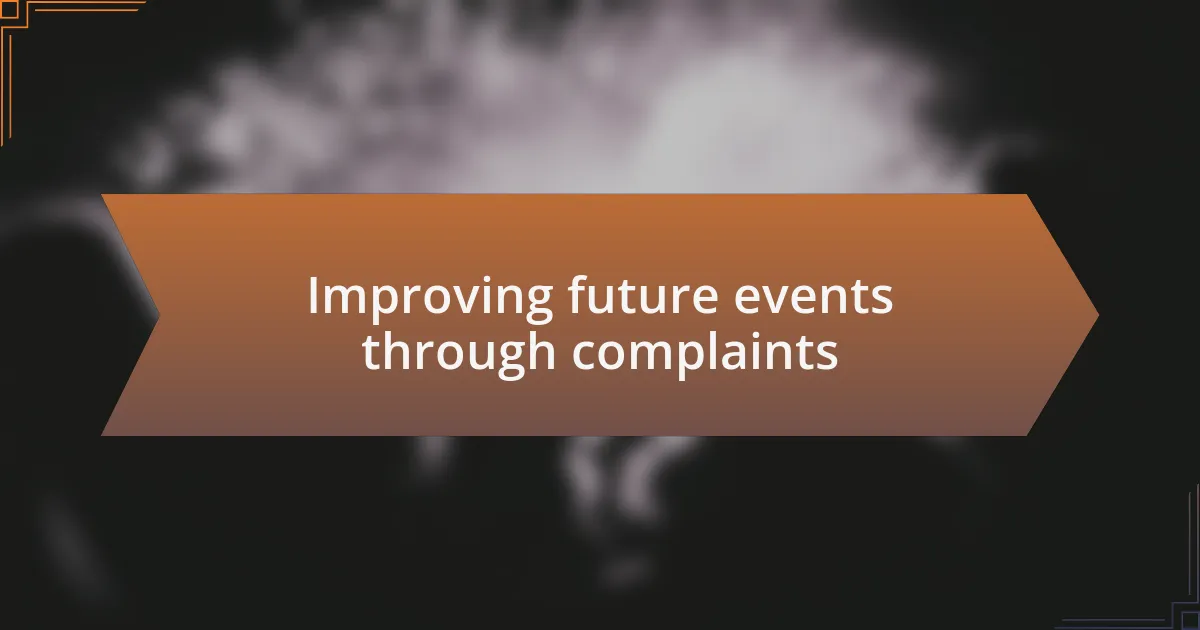
Improving future events through complaints
I’ve often found that complaints can serve as a roadmap for future events, guiding one to avoid past pitfalls. After a particularly challenging seminar where audio issues disrupted the flow, I took a step back and examined the feedback closely. It became evident that our reliance on outdated equipment was a recurring criticism, prompting me to invest in cutting-edge technology. Isn’t it fascinating how a single inconvenience can lead to a more polished experience for future attendees?
Listening to complaints also opens avenues for innovation. At one of my events, attendees noted that the schedule felt too rushed. This prompted me to implement staggered sessions and allow for longer breaks in future events. By reimagining the structure, not only did I improve the overall pacing, but I also elevated guest satisfaction. I wonder if we sometimes underestimate how small adjustments can lead to a more enriching experience.
Moreover, involving clients in the feedback loop cultivates trust and loyalty. After addressing a complaint regarding the lack of vegetarian options at one event, I sent a follow-up survey to those affected, asking for their thoughts on potential menu additions. The positive response revealed not only appreciation for being heard but also gave me the confidence to expand our catering choices. How often do we realize that engagement can turn complaints into collaborative opportunities?